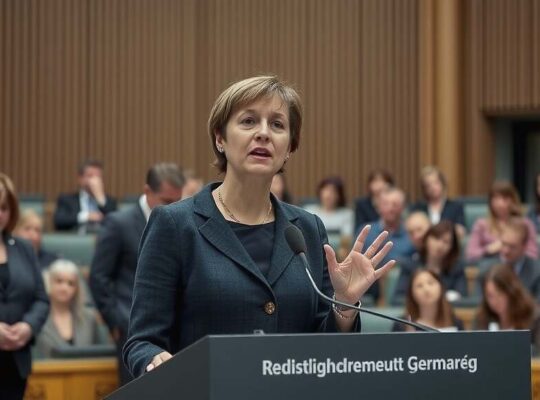The slow pace of flood protection measures in North Rhine-Westphalia (NRW), nearly four and a half years after the devastating 2021 floods, is prompting a stark warning about bureaucratic gridlock and a call for radical reform. Thomas Wilk, Regierungspräsident (Regional President) of Cologne, is advocating for a legal prioritization of flood protection projects, arguing that the public interest must take precedence over individual legal challenges.
Speaking to the “Kölnische Rundschau”, Wilk drew a parallel to the approval process for wind turbines, where legal disputes often cause lengthy delays. His proposal would effectively curtail the ability of objections to halt critical flood prevention infrastructure. He envisions this as a key element should the Cologne regional government, serving a population of 4.5 million, be designated a model region for broader administrative reform as suggested by the “Initiative für einen handlungsfähigen Staat” (Initiative for a Functional State).
Wilk highlighted the deeply concerning reality that, even three and a half years after the July 2021 floods, tangible progress in heavily affected municipalities has been minimal. He stated that even a subsequent major rainfall event hitting Bad Münstereifel would likely result in the same catastrophic flooding experienced in 2021. While he attributes the inertia not to the fault of authorities directly, the extensive investigations and expert assessments required for even basic infrastructure like rainwater retention basins are crippling the response.
The core of the issue, Wilk argued, is a systemic erosion of public interest, consistently overshadowed by individual legal challenges. He is pushing for a broader deregulation agenda, suggesting the removal of redundant regulations for every new imposition, citing the quota for wheelchair-accessible housing as a prime example. Wilk expressed preference for increased market freedom, asserting that developers need to be confident they can lease properties in an aging demographic.
Beyond streamlining flood protection, Wilk champions the adoption of a “permit fiction” approach, particularly within complex approval processes involving multiple agencies. He cited the one-year delay in a Köln shipping pier renovation permit as evidence of the need for drastic simplification. His proposed solution is to establish strict timelines. If a city, like Köln, fails to respond within a set period – his example being eight weeks – approval would be tacitly granted and the process moved forward.
The “Initiative für einen handlungsfähigen Staat” a group founded by media executive Julia Jäkel, former federal ministers Peer Steinbrück (SPD) and Thomas de Maizière (CDU) and former Constitutional Court President Andreas Voßkuhle, has proposed the Cologne regional government as a testing ground for these far-reaching reforms. Further model regions are being considered in Saxony, the port city of Stralsund and another Western German municipality, signalling a potentially broader push to overhaul administrative processes and prioritize public needs over protracted legal entanglements. The initiative’s backing from prominent figures carries significant political weight, suggesting these proposals could gain traction amongst policymakers seeking to address bureaucratic inefficiencies and improve the responsiveness of government.












